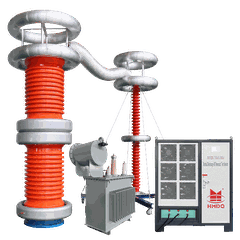How Resonant Test Systems Work: The Science of Resonance
These systems exploit series resonance:
Frequency tuning: Adjust the system's frequency to match the natural resonance of the test object (e.g., transformer, cable).
Voltage amplification: At resonance, reactive power circulates between the reactor (inductor) and test object (capacitor), amplifying voltage with low input power.
Stable output: Maintains precise voltage control even for large capacitive loads.
Key advantage: 90% less input power vs. conventional test sets, reducing generator size and operational risks.
3 Critical Applications in Power Systems
Transformer Testing
Application: AC withstand voltage tests, partial discharge measurement.
Why resonance? Handles high capacitance of large transformers without oversized power sources.
Cable & GIS Testing
Application: Commissioning long cables or gas-insulated substations (GIS).
Benefit: Portable systems for on-site testing up to 500 kV.
Generator & Reactor Testing
Application: Insulation diagnosis after installation/repair.
Case: A utility used a 300 kV resonant system to test offshore wind farm cables, avoiding costly barge-mounted generators.
Types of Resonant Test Systems
| Type | Best For | Key Feature |
|---|---|---|
| Tunable Reactor | Labs/fixed sites (transformers) | Manual inductance adjustment |
| Auto-Tuning | Field testing (cables, GIS) | AI-driven frequency matching |
| Portable Systems | On-site commissioning | Compact design, < 100 kg weight |
How to Choose a Resonant Test System: 5 Key Factors
Voltage & Current Rating
Match max voltage (e.g., 400 kV) and current (e.g., 1 A) to your test objects.
Frequency Range
Opt for 30–300 Hz systems for flexible testing (IEEE/IEC standards).
Portability
For field work, prioritize modular designs with wheeled reactors.
Safety Features
Look for automatic discharge, overvoltage lockout, and remote control.
Harmonic Suppression
Critical for PD testing-choose systems with THD < 3%.
Top 3 Resonant Test System Manufacturers
European Brands
Renowned for precision & compliance with IEC 60270. Ideal for utilities.
North American Innovators
Lead in rugged, portable designs for harsh environments.
Asian Value Leaders
Offer cost-effective systems with auto-tuning tech.
Case Study: The Resonance Advantage
A transmission operator reduced cable testing time by 60% using an auto-tuning resonant system, eliminating the need for diesel generators and cutting CO₂ emissions.
Why Resonance Testing Dominates HV Diagnostics
Resonant test systems solve the "high-voltage, low-power" paradox-enabling safer, greener, and more economical testing of grid-critical assets. For utilities, contractors, or manufacturers, investing in resonance tech means faster commissioning, lower costs, and uncompromised safety.
Pro Tip: Prioritize systems with digital controllers for real-time Q-factor monitoring-it predicts insulation health during tests!











